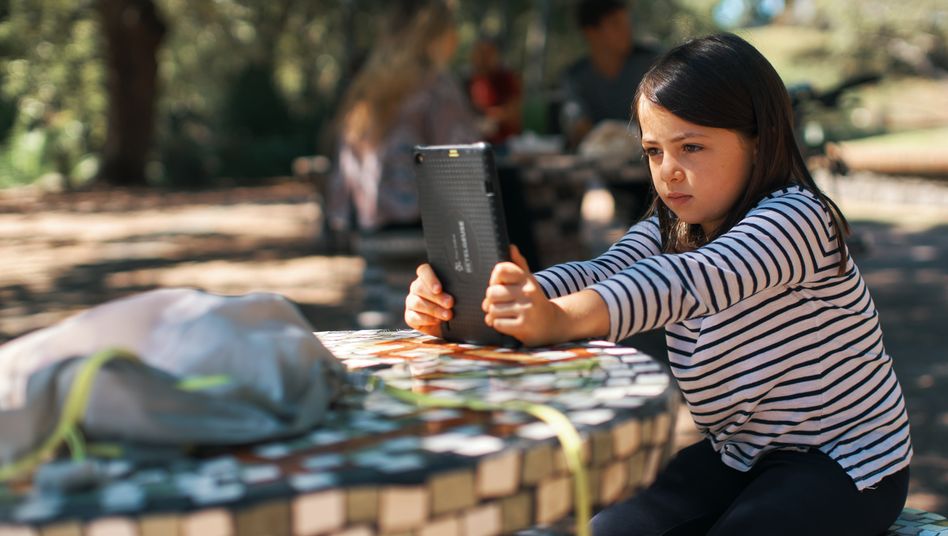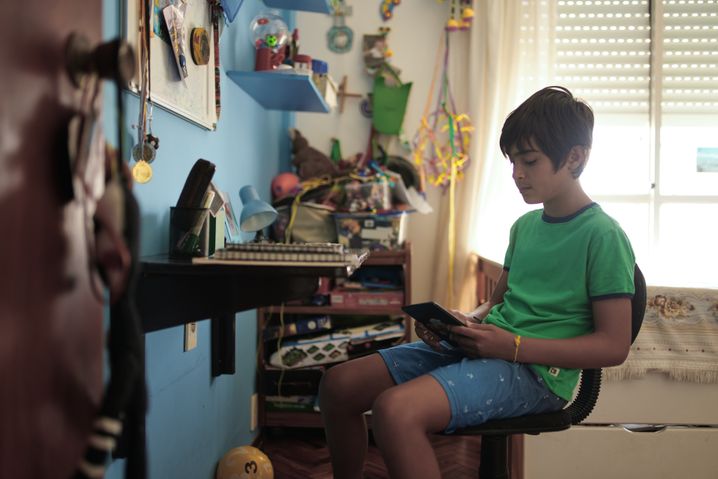www.aljazeerah.info
News, March 2020
Archives
Mission & Name
Conflict Terminology
Editorials
Gaza Holocaust
Gulf War
Isdood
Islam
News
News Photos
Opinion Editorials
US Foreign Policy (Dr. El-Najjar's Articles)
www.aljazeerah.info
|
Editorial Note: The following news reports are summaries from original sources. They may also include corrections of Arabic names and political terminology. Comments are in parentheses. |
Why Uruguay's Schoolchildren Are Doing So Well in the Pandemic
March 23, 2021
 |
 |
| Elementary school student Amelia, 7, doing her school work in a park in Montevideo, using a tablet supplied to her by the government, March 23, 2021 der spiegel | Leandro, 10, working on his tablet at home in Montevideo, March 23, 2021 der spiegel |
Why Uruguay's Schoolchildren Are Doing So Well in the Pandemic
Every child gets a laptop from the state, along with online teaching material and animated school books: Uruguay shows how it's done when it comes to digital education. By Nicola Abé in São Paulo 23.03.2021, 12.28 Uhr
For our Global Societies project, reporters around the world will be writing about societal problems, sustainability and development in Asia, Africa, Latin America and Europe. The series will include features, analyses, photo essays, videos and podcasts looking behind the curtain of globalization. The project is generously funded by the Bill & Melinda Gates Foundation.
Two weeks after Amelia's first day of school last March, she was suddenly unable to go anymore. Her school had been shut down because of the coronavirus pandemic. But for the first grader from Uruguay, it wasn't such a big deal. She learned the alphabet by way of digital tutorials, and she had so much fun with the digital math lessons that she did additional exercises. There were video conferences three times a week, so she could get to know her teacher and classmates better. And under the leadership of her physical education teacher, Amelia, 7, did gymnastics exercises in her living room.
Amelia, though, is not some well-off pupil at a private school. She goes to a public school in Uruguay's capital of Montevideo. And like all of the other schoolchildren in the small country sandwiched between Argentina and Brazil, she received her tablet computer from the state.
Uruguay has been investing in digital education for years in addition to making it accessible to everyone. The country's education system was better prepared for the pandemic than most of the other countries in the region, and also better than many in the wealthy West. Whereas some teachers in Germany had no contact with their students for several weeks, there was a constant exchange between pupils and teachers in Uruguay. Instead of blurry scans and erroneous internet links hiding content that could not be found, Uruguay was able to offer schoolchildren digital schoolbooks with science experiments, homework in the form of quizzes or games, interactive video conferences, personalized exercises, and chats to clear up any questions.
It has already been more than 10 years since the country – as one of six around the world – introduced a one-laptop-per-child policy. On top of that, Uruguay installed free internet in public squares around the country, including in rural areas, and also founded a state agency for digital education called Plan Ceibal. "In general, the last school year worked quite well," says Fiorella Haim, a manager at Plan Ceibal.
All that makes Uruguay the exception in a region where the educational prognosis tends to be disastrous. UNICEF believes that 2020 was a lost year for millions of schoolchildren in Latin America. Around a third of the children, the UN agency believes, hardly learned anything at all, while more than 3 million will likely never return to school. Experts believe that it will be more of the same in 2021, with lockdowns and school closures.
"Children, particularly those from poorer families, are the biggest losers of this crisis. Their dream of a better future has already been destroyed," says Brazilian education expert Claudia Costin, a former senior director for education at the World Bank. In addition, she says, the schooling crisis has intensified the already extreme educational inequalities on the continent.
Private schools and their clientele were much better able to deal with the closures, Costin says. She also observed the phenomenon of "illegal schools," in which wealthy parents, or those in the upper-middle class, hired private teachers for their children – while poor children in public schools didn't even have access to computers or internet at home.
In Uruguay, 85 percent of all schoolchildren attend public schools. "When education shifted online last March, we were able to react flexibly," says Haim, the manager from Plan Ceibal. The agency has been providing continuing education to teachers for years and also operates a centralized platform for digital schoolbooks, from which exercises and content can be downloaded.
At the beginning of the pandemic, Plan Ceibal expanded the capacity of its servers "essentially overnight." In addition, the country began offering every schoolchild 50 gigabytes of free internet per month. "Ninety-eight percent of the children regularly used the digital lessons," says Haim. Poorer children in rural areas also participated. "We don't know exactly how we did it, but we did."
The experts, though, all agree that laptops alone aren't enough. A coherent concept is necessary. The example of Uruguay demonstrates first and foremost that digital education materials are vital, which is why Plan Ceibal also promotes the development of innovative software solutions. The agency, for example, purchased the digital book EduCiencias, which teaches children the natural sciences in a playful manner. It looks like a comic, with a cat helping out with physics experiments, for example. "We want digital lessons to be fun and motivational for the children," says developer Federico Bello. "To achieve that goal, we work together with pedagogical experts and psychologists."
Bello left his job at the Central Bank of Uruguay in 2018 to establish the startup Edu Editorial with two friends. They are currently working on a new platform called Boki, which is designed to help teachers produce exciting digital presentations. "Frontal instruction can be combined with experiments, animations, videos, interactive games and competitions," Bello says.
In addition, he and his colleagues are developing an app intended to help students better deal with emotional problems like stress and fear. The products from Edu Editorial have already been exported to Peru, Chile and Mexico. This year, the founders hope to expand into the Arab market.
Bello doesn't understand why there are children in rich countries like Germany without access to a computer and internet. In a digital world, he sees it as being a right for children. "Every child should have a laptop and internet," he says. "We've managed to do it too."
With its 3.5 million inhabitants, Uruguay is much smaller, and much better off than most other countries in the region. But it is far away from being a wealthy country – in the global rankings, it is below average. "It is a question of priorities and will," says Miguel Brechner, an expert in digital education who founded Plan Ceibal in 2007. "Our president back then, Tabaré Vázquez Rosas had a great vision. He wanted every child to be able to do anything they wanted." Plan Ceibal costs $100 per child each year, including the laptop, teacher material, teacher training and internet at schools. Parents even end up saving money because they have to buy fewer books and teaching materials.
Brechner has now also begun consulting countries and international organizations on educational issues. He says that when people ask him these days if it is really necessary for every schoolchild to have a laptop and internet access, he asks: "Do we really need electricity and warm water?" He says he is in no way interested in replacing teachers with technology. "But we can't just continue on as we were before the pandemic," Brechner says. "We are living in the 21st century and have 19th century schools."
Regarding the German school system, education expert Costin says that it is by-and-large quite good. "But when you are very good at something, there is frequently a danger that you become lazy, that the desire and energy for innovation wanes." Uruguay managed to build something essentially from nothing, she says. But that doesn't mean that Germany should become like Uruguay, she adds. The country is in second place in the PISA rankings for South America, but in global comparisons, the region doesn't perform well, she says, adding that not everything is perfect. Still, it is possible to learn something from Uruguay's success: "The future has to be a hybrid of online and offline teaching so that we are better prepared for future crises."
Margarete Sachs-Israel, UNICEF's regional education advisor for Latin America, believes that another reason Uruguay is such a successful model is because it reopened its schools early on in the crisis. There is simply no substitute for in-classroom teaching and contact with other schoolchildren and teachers. "School closures don't just impair learning, but also the health and safety of the children," she says. Many children in Latin America are dependent on school meals, she points out. Plus, domestic violence and child labor have both risen sharply as a result of the crisis.
The first schools that reopened in Uruguay were those with fewer pupils in rural areas, a strategy intended to reach the most vulnerable schoolchildren, but also to collect experience with protective measures and to lower the fears of the virus among parents and teachers. The fact that many countries around the world have simply kept schools closed, essentially forcing children to bear the lion's share of the crises burden, is something that infuriates Sachs-Israel. "We now know from studies that there are workable hygiene concepts for schools," she says.
Amelia, the elementary school pupil in Montevideo, also returned to school after four months, in contrast to most other children in Latin America. Even there, though, her tablet is an important part of her lessons. She says she especially likes all of the virtual buttons she can push on her tablet. And the seven-year-old also has a pretty good idea of she wants to be when she grows up – a job that will let her push all kinds of buttons: "spaceship pilot."
Digital Education: Why Uruguay's Schoolchildren Are Doing So Well in the Pandemic - DER SPIEGEL
***
Share the link of this article with your facebook friendsFair Use Notice
This site contains copyrighted material the
use of which has not always been specifically authorized by the copyright
owner. We are making such material available in our efforts to advance
understanding of environmental, political, human rights, economic,
democracy, scientific, and social justice issues, etc. We believe this
constitutes a 'fair use' of any such copyrighted material as provided for
in section 107 of the US Copyright Law. In accordance with Title 17 U.S.C.
Section 107, the material on this site is
distributed without profit to those
who have expressed a prior interest in receiving the included information
for research and educational purposes. For more information go to: http://www.law.cornell.edu/uscode/17/107.shtml.
If you wish to use copyrighted material from this site for purposes of
your own that go beyond 'fair use', you must obtain permission from the
copyright owner.
|
|
|
|
||
|
||||||


